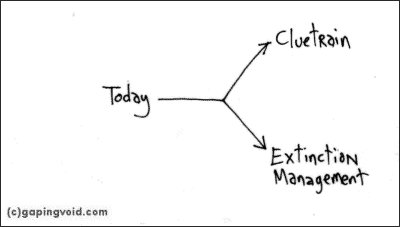The Blogosphere For Sale
A new service called PayPerPost.com matches bloggers with companies who will pay them to blog about a product:
Murphy, who founded a Tampa-based interactive ad agency called MindComet, also runs a side business that pays bloggers to write nice things about corporate sponsors -- without unduly worrying about whether or not bloggers disclose these arrangements to readers. (A scan of relevant blog searches strongly suggests that, often, they don't.) (BusinessWeek)
I agree with Pete Cashmore's take on this “service”:
PayPerPost is a great new way to lose your credibility as a blogger - the service will pay you to write reviews of new products and services. Advertisers post “opportunities” on the site - they can specify whether the post should have pictures, and even request a positive review. That last part really crosses the line, and it’s sure to destroy any credibility you have as a writer. ... PayPerPost is a terrible, terrible idea and totally unethical. (Mashable)
Even TechCrunch is weighing in with an opinion with a post titled, 'PayPerPost.com offers to sell your soul':
Is this a bad joke designed to torpedo the blogosphere’s credibility in general? It doesn’t appear to be. If we’re all trying to negotiate a space between Hollywood and mainstream journalism, this is taking things way too far towards the most insipid parts of Hollywood.
Clearly comfortable with the “all press is good press” paradigm, Murphy is emailing bloggers with a link to scathing coverage at Business Week (”Polluting the Blogosphere“) and even includes the words “As seen in Business Week” in the company logo. (TechCrunch)
I think that many of us would agree that the people who take money from companies to say nice things about a product without disclosing the relationship are those at the bottom of the blogosphere barrel (where all the yucky stuff accumulates). Like many other bloggers, I take it seriously. I spend time researching and thinking about what I write, and I would never write something I did not believe or otherwise allow someone else to dictate what I can or cannot say (paid or otherwise). Needless to say, not everyone has these standards, and like any other medium, the reader has to keep the source in mind. I will pay much more attention to something that I read in TechCrunch over something on some random person's blog the same way that I would be more likely to believe something in the Wall Street Journal over something that I saw in a banner ad on the web. The difficulty with this situation is that the banner ad can be made to look like the Wall Street Journal with paid content bloggers masquerading as respectable sources of information.




